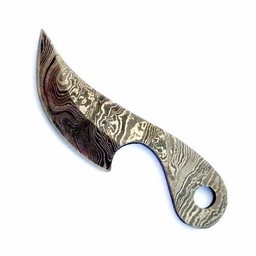Product description
This hand-forged Viking neck knife is based on a 9th-10th century original found in Gotland in Sweden. It is made of 256 layers of AISI 11095 and AISI 4043 tempered carbon steel tempered at a hardness of 56-58 HRC. This knife is delivered including a leather sheath with a leather cord that can be worn around the neck.
Details:
Material: 256 layers of AISI 11095 and AISI 4043 tempered carbon steel tempered at a hardness of 56-58 HRC, leather
Length knife: 11 cm
Blade width: 3 cm
Blade length: 7 cm
Edge: sharp
Delivery inc. sheath
Based on a historical original
Transport weight (gram): 200 *
We do not sell this product to customers under the age of 18. Click here for more information on the European arms acts.
This item is produced in limited quantities only. This means that every piece is unique. Sizes & finish may vary lightly from piece to piece.
Prevent rust and corrosion by oiling your weapons regularly. Remove rust easily with black sandpaper. Remove burrs with a whetstone. Make sure you have removed all burrs before using a battle-ready weapon, as they can cause wounds.
Maintenance & care
Just as with weaponry, you can care for your shoes and leatherware by applying a little Ballistol after cleaning. This prevents the leather from drying out.
The original method of making Damascus steel from Wootz steel was lost in the modern era. Nowadays, the name Damascus steel is used as a generic term for pattern welded / laminated or melted steel made out of two or more different steel types.
We ask for a one-off age verification when purchasing sharp objects
Click here for more information.
The parcel of this item will be labelled: “Warning, sharp content. Please only deliver to adults (18+).”
Packaged with 100% recycled material
When packaging this item, we exclusively use 100% recycled plastic and recycled paper/cardboard from FSC certified forests. We reuse a large part of the material directly without the intervention of a recycling process.
Recycle the material by separating your waste:
1. Cardboard: separate or reuse your paper.
2. Plastic cushions, clothing bags and plastic tape: separate or reuse your plastic. If possible, pierce the cushions with a volume reduction needle.
3. Paper packaging for jewelry and small items: these have a plastic inner layer. Remove these, then separate your paper and plastic.








